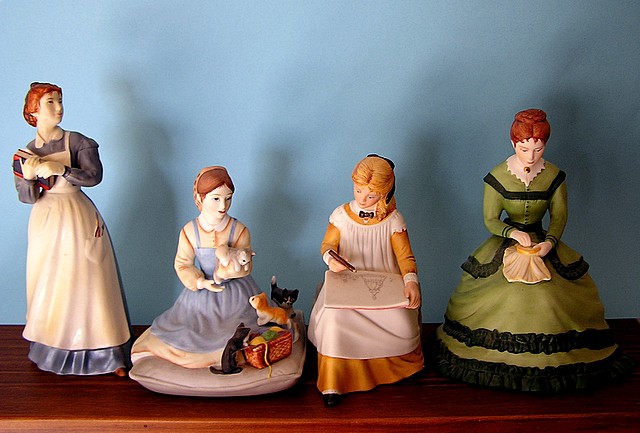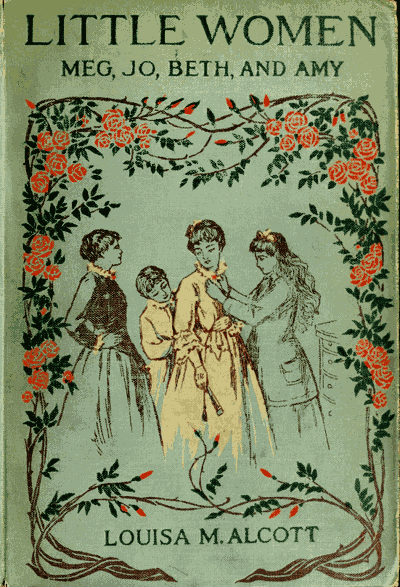Parenting by the Books: ‘Little Women’
The horrors of marriage and sleep training.


There is probably no more important text about early parenthood than the chapter in Little Women titled “On the Shelf.” It’s up there with the best of creative representations of mothers and babies, such as Rosemary’s Baby or The Babadook. Because, oh, yes, “On the Shelf” is its own little horror flick. The Dovecote — as Laurie has christened Meg and John Brooke’s tiny marital home — is a claustrophobic nightmare out of Poe, the babies Demi and Daisy cherubic tiny cannibals, Meg a new mother at her wit’s end, and John Brooke The Husband-Father whose out-of-touchness sends chills down my spine.
Perhaps you don’t remember this chapter’s gothic horror. “On the Shelf” is the last chapter devoted exclusively to Meg’s storyline (Demi and Daisy get their own later, and Meg pops up here and there, but this is Meg’s swan song) and it is about two things: sleep training and maternal libido. What’s the problem? Meg isn’t paying attention to her husband, not at 3-months post-twins-partum, not at six months, and not even now, at a year. John has taken to spending his evenings at “Mrs. Scott’s” (!!!) where “the parlor was always bright and attractive, the chess-board ready, the piano in tune, plenty of gay gossip, and a nice little supper set forth in tempting style,” rather than at his own home where Meg is always hushing him, his sleep is “broken by infant wails and visions of a phantom figure pacing noiselessly to and fro” — the “captive mamma” in “the sacred precincts of Babydom.”
Marmee is called in for advice. “You have only made the mistake that most young wives make — forgotten your duty to your husband in your love for your children. A very natural and forgivable mistake, Meg, but one that had better be remedied before you take to different ways.” The problem with Marmee, always, is that she is right, but like only right within the truly fucked up scales of patriarchy. She’s a diagnostic genius, always on the lookout for symptoms in her daughters of the opportunistic infections that the seemingly uncurable systemic disease of patriarchy leaves them vulnerable to: excessive focus on their children, the anger that courses through them, their tendency to selfishly grab for some small pleasure like rats with cheese. I mostly hate what Marmee says, but truly what use is it to hate the Marmee and not the game?

After their conversation, Meg decides to try a little harder at home. She puts on a nice dress, puts the children to bed, supplies her own parlor with a tidy and satisfactory supper and holds up her end of the boring political conversations John wants to have. Yet her efforts are stymied by Demi, the ends of his long nightgown hitched up over one of his arms, who keeps appearing in the parlor begging for a little sugar (yep).
Meg cannot solve this problem. She cannot solve the libidinal love her children feel for her, she cannot solve the fact that she is exhausted because children are fundamentally exhausting, and she cannot solve the fact that her children’s touch satisfies her. She cannot solve this, because, on some level — and this doesn’t have to be an aspirational level, or any kind of good, positive, or mentally healthy level — on some level she is not actually experiencing a problem, she is experiencing John’s experience of a problem.
So John swoops in and solves his own damn problem, only he solves it by making it seem like he’s solving her problem. John blinks into the waking nightmare of caring for babies and declares, “We shall never know any peace till that child learns to go to bed properly. You have made a slave of yourself long enough; give him one lesson and then there will be an end of it.” He puts the child to sleep — an exhausting task, to be sure, more exhausting “than his whole day’s work,” but a completed task nonetheless. He returns to the parlor, where he and Meg engage in some conversational flirtation — she agrees to talk politics with him, he tries to talk millinery with her — and then basically get it on. The chapter ends by declaring that Meg and John have found the key to household happiness: young wives and mothers consenting to being laid “on the shelf” of “real home-love and mutual helpfulness.” Like an old blanket, folded away.

But — and here is why she is a genius — if Alcott weaves a surface narrative about a marriage remaking itself in response to the problems of sleep training, the problems of domestic authority, the problems of a sexless marriage, she also leaves just enough snag to unravel that same narrative. She knows we’re all hungry to locate the Dovecote’s problem in the mother — the addled mother, the overinvolved mother, the mother who charmingly provides the incompetence that her husband can then gently and reasonably correct. She gives us what we want, with a perverse twist.
Because despite the chapter’s ending claim, we have not in fact arrived at “mutual helpfulness.” Rather, we’ve arrived at Meg’s crushed artistry and authority. The children asleep, Meg is sitting there, sewing a new hat, which John doofusly does not understand: “That’s very pretty; is it what you call a breakfast cap?” he asks, to which she exclaims, “My dear man, it’s a bonnet — my very best go-to-concert and theatre bonnet!” Oh, he realizes, “I beg your pardon; it was so very small, I naturally mistook it for one of the fly-away things you sometimes wear. How do you keep them on?” Turns out it doesn’t matter, because he gets so aroused by not understanding her goddamned hat that Alcott draws the curtains on the entire scene: “Never mind what John said, or what a very narrow escape the little bonnet had from utter ruin.”
John Brooke does not understand her hat and so he brings it near to ruin. He doesn’t understand her hat! Do you hear what I’m saying?! What I’m saying is that this entire chapter is a complete and total nightmare in which a unique maternal experience of libido, authority, and creativity is folded up and put away because John Brooke is annoyed by his kids. He’s annoyed by his kids because children are annoying, so the problem clearly isn’t in the fact of his annoyance. It’s that it never occurs to him to wonder how and why Meg’s experience of being (or not being) annoyed at the children is different from his. To ask her what satisfactions she gets and what she does not get from infant care. To consider her labor in trying to teach her children to sleep as labor (even if it is marked by inefficiencies or failures), rather than as addled maternal indulgence.

Why is it important that all of this domestic horror takes shape around the questions of getting the children to sleep? The thing that elevates this chapter to an aria for me is its incredibly smart inclusion of the libido in the equation of parental strife over infant sleep. These are the nighttime questions of reproduction, the questions that are still really hard to talk about. Which is perhaps why, when we talk about infant sleep, we take refuge in the handbook languages of parenting “approaches” and “methods”: attachment parenting, Weissbluth, Ferber, CIO, co-sleeping, wonder weeks, extinction, graduated-extinction, oh God, even just writing these phrases makes me break out in hives. Babies are incredibly seductive, basically a continual offer to flesh pile. It can be really satisfying….until, sleepless again, it isn’t. How can we talk about the push/pull of infant desire when we’re so busy identifying our “sleep solutions”?
“On the Shelf” is one of my parenting talisman texts not because it provides actionable advice or guidance on domestic and reproductive conundrums but because it is a warning: in our optimizing, tweaking, projection, and misogyny when it comes to reproduction and the care of infants, we are all John Brooke. Seriously: THE HORROR! We have no real language through which to discuss the nighttime questions, the flesh pile questions: the closed-system satisfactions of infant touch and flesh, the simultaneous superfluity and centrality of one’s partner in childrearing, the extreme difficulty that babies introduce into understanding one’s own libidinal life.
And the person who suffers most without these languages is the Meg, forever running the hamster wheel of contemporary maternal weakness and authority: too central to disregard, too ineffective to value. Fly-away, small, trivial, folded up, on the shelf. Folded up on that shelf, a Meg has no time or space to consider her own experience of maternal libido, of what she wants, what now animates her own urging life force. Who knows! Maybe the animating force she most desires will in fact be bonnet-crushing sex with John Brooke (note: it will not, John Brooke is the worst). But, Meg! Please don’t agree to bundle yourself up and away just because the flesh pile of motherhood has introduced complications into your life. It’s time to air out that closet, unfold yourself and take up some space.
“Parenting by the Books” is a series about parenting and classic literary texts.
Sarah Blackwood is editor and co-founder of Avidly and associate professor of English at Pace University.